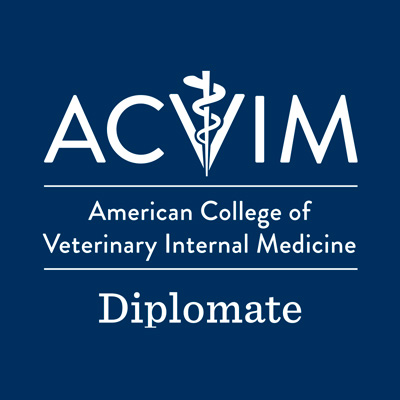

Dr. Kacie Schmitt Felber
Board-Certified Cardiologist
Dr. Kacie Schmitt Felber is a board-certified cardiologist in Frederick, MD. She is available to serve general practices and emergency animal hospitals throughout her service area in the Frederick region.
Biography
Dr. Kacie Schmitt Felber was born and raised in Cumberland, Maryland. She earned her Bachelor of Science in Poultry Science from North Carolina State University before continuing on to receive her Doctor of Veterinary Medicine from NC State’s College of Veterinary Medicine in 2008.
Following graduation, Dr. Schmitt completed a one-year comprehensive medical and surgical internship at VCA Veterinary Referral Associates in Gaithersburg, MD. She then pursued a cardiology residency with CVCA Cardiac Care for Pets, achieving Diplomate status in the American College of Veterinary Internal Medicine (Cardiology) in 2013.
For over a decade, Dr. Schmitt worked in private practice specialty hospitals across the Maryland-Virginia region, where she provided advanced cardiac care to hospitalized patients and through outpatient services. She has also contributed to multiple research efforts throughout her training and career, including the HALT study, which seeks to evaluate the effectiveness of a disease-modifying treatment for subclinical hypertrophic cardiomyopathy (HCM) in cats.
Dr. Schmitt’s professional interests include long-term management of heart disease and congestive heart failure, as well as the use of cardiac biomarkers in both emergency and diagnostic settings.
Dr. Schmitt is deeply committed to open communication between the client, primary care veterinarian, and specialist, ensuring all factors are considered when developing individualized treatment plans.
Dr. Schmitt is excited to join MOVES and help bridge the gap in specialty care by increasing access to high-quality, mobile cardiology services.
In her free time, Dr. Schmitt enjoys traveling, the beach, and spending time with her friends and family. She shares her home with two dogs, Brutus and Maxine, five fish, and one aquatic frog—though her oldest son is on a mission to turn the house into a zoo. A passionate NC State football fan, she proudly cheers on the Wolfpack—GO PACK!
CV
- 2025
Joined MOVES - 2013
Achieved board certification through ACVIM (Cardiology) - 2010-2013
Completed cardiology residency - 2008–2009
Completed rotating internship in small animal medicine and surgery - 2008
Graduated with Doctor of Veterinary Medicine degree (Magna Cum Laude) - 2004
Graduated with Bachelor of Science degree in Poultry Science (Summa Cum Laude, Valedictorian)
Send a Message to Dr. Schmitt
What is a board-certified veterinary cardiologist?
A veterinary cardiologist is a specialist that has advanced training in the heart and circulatory system. To become a board certified veterinary cardiologist a veterinarian usually completes a one year internship followed by extensive specialized training in an approved residency training program (usually 3-5 years).
Board certified veterinary cardiologists focus on diagnosing and treating disease of the heart and lungs, which include Congestive heart failure (CHF), Heart muscle disease (Dilated cardiomyopathy or hypertrophic cardiomyopathy), age-related changes to the valves of the heart (Degenerative mitral valve disease), coughing and other breathing problems, congenital (present at birth) heart defects, cardiac arrhythmias (problems with the rate and/or rhythm of your animal’s heart), diseases of the pericardium (sac surrounding the heart), cardiac tumors, high blood pressure (hypertension), and pulmonary hypertension (high blood pressure in the lungs).
Veterinary cardiology specialists will perform a complete and thorough physical examination on your animal, and based on these initial findings, additional tests will be discussed. Depending on your animal’s condition, diagnostic testing or treatments may include echocardiography (sonogram) – non-invasive ultrasound imaging of the heart, electrocardiography (ECG) – non-invasive electrical reading of the heart’s rhythm, blood pressure evaluation, Holter monitor – 24 hour ECG performed at home, or radiography (x-rays) of the chest and lungs.

